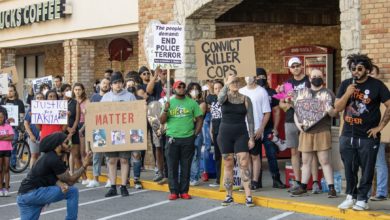Protests continue to take place across Nigeria after erupting earlier this month over incidents of extreme police brutality and corruption at the hands of the elite Nigerian police force, the Special Anti-Robbery Squad. The protests were initially sparked after widespread online outcry after a video published online showcased a SARS officer murdering a young man in Nigeria’s Delta State.
This became the tipping point for Nigerian youth, who have been routinely targeted by the SARS since its establishment. Ahmed Rufai Isah, a Nigerian public affairs commentator and journalist reporting from the country, told Liberation News that the Nigerian “people have always had these built-up emotions about the misgovernance in the country, the lack of stable electricity, bad policies, the lack of justice…and lack of job opportunities. Just recently the Bureau of Statistics of Nigeria published unemployment statistics, [which is] at an all time high.”
He further stated the youth, by a large margin, bear the brunt of this and so “people have always had this built up resentment for the government, and there is a lack of trust from endless undelivered promises.”
Calls for the abolition of SARS swept social media as people shared their experiences with police brutality, which became an organic call to the streets, starting in Lagos and Abuja. Although The Feminist Coalition, founded by Damilola Odufuwa and Odunayo Eweniyi, have been at the forefront, the protests itself have remained largely spontaneous. Even so, the widespread support within the movement has sustained “the most organized protests seen in Nigeria’s history to date,” according to Isah.
The protests so far have swept about 24 to 26 cities across the country. The protests have initially crowdsourced funds to provide logistical and legal support for those arrested illegally by the police. But, according to Isah, recent crackdowns have caused the movement to turn to Bitcoin currency in an attempt to override government interventions.
A long history of abuse by SARS
SARS was established in 1992 as an anonymous 15 member unit to combat widespread violent crimes like kidnappings and robberies. Although initially successful in its goal, critics say that soon after the elite unit was hit by allegations of corruption and the very criminal behavior they were expected to combat.
Citizens tell tales of SARS officers specifically targeting young men who are presumed to be wealthy or work for tech companies, and who are then forced to withdraw large sums of cash from ATMs. These men risk beating or even death if they refuse to comply with the demands of the SARS officers. Despite these crimes, SARS was protected by its anonymity and practice of patrolling disguised as plain-clothed civilians.
Anger against police brutality is not new among the Nigerian people, but the recent pandemic and university closures are believed to have created fertile ground for the anger to finally spill over. The protests, like those in the United States, have largely been led by young Nigerians and students, with the first in-person protest being on October 7.
Isah states that the protests against police brutality in the United States have “sort of also opened the eyes of a lot of young Nigerians to the possibility of protesting at that scale in terms of the abuses and their experiences. A lot of the ways in which people here [have] organized these protests borrows ideas from the BLM movement … ”
Nigerian President, Muhammadu Buhari, complied with protesters demands and dissolved the SARS on October 11, and replaced it with a new Special Weapons and Tactics team. Protesters are skeptical of this move and referred to the earlier unsuccessful dissolution of SARS in 2017, and that a rename is not enough to curb police brutality. Isah also mentions that protesters want “justice [and accountability] for the police for those who were arrested illegally and for those killed [by the police].”
Furthermore, protests are now demanding complete institutional overhaul as law enforcement continue their assault of peaceful protesters across Nigeria and, in some cases, stand by and allow hired criminals to brutalize the protesters as well.
People across the world are rising up to demand an end to the crimes of law enforcement that are perpetrated against working people with impunity. In Nigeria, the United States and elsewhere, the elite at first try to get away with only superficial reforms. But the determination of the people united in struggle can overcome the power of the police!






